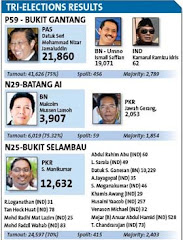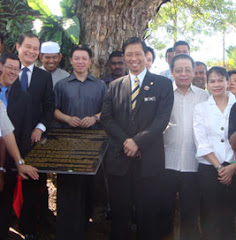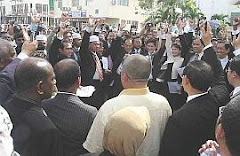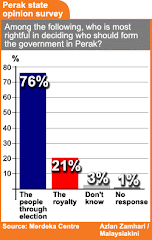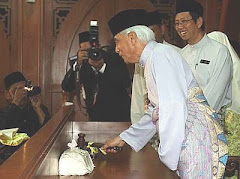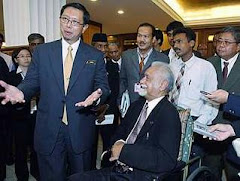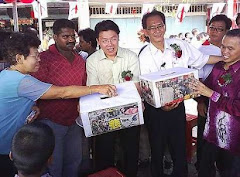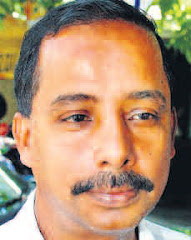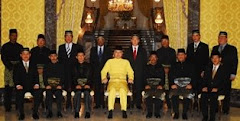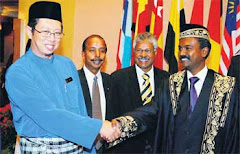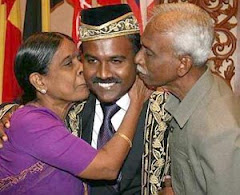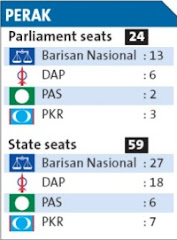June 27, 2009 By CHRISTINA KOH
IPOH: Aulong assemblyman Yew Tian Hoe is suing Perak deputy speaker Hee Yit Foong for allegedly assaulting him in the face with pepper spray during the tumultous May 7 assembly sitting.
Yew's lawyer Leong Cheok Keng filed the papers at the High Court Registrar here at 11.15am Friday.
Yew, wearing a black T-shirt and a headband with the words 'Bubar Dun', was accompanied by Taiping MP Nga Kor Ming, Titi Serong assemblyman Dr Khalil Idham Lim Abdullah and other Pakatan Rakyat members.
According to the statement of claim, Yew alleged that Hee had attacked him by spraying a pepper spray canister into his face, particularly his left eye.
As a result, he suffered pain and injury, mental shock and trauma, loss of dignity, and consequently public shame, humiliation and mental distress.
The statement added that Hee was unrepentant and had refused or failed to apologise even though given the opportunity to do so.
"She had told lies to the mass media claiming that the device had been a hotel key chain or a pen drive, before admitting that the same was actually a pepper spray canister," it said.
Claiming that Hee's actions were motivated by malice, Yew is suing for an injunction to restrain Hee and her agents from further abuse or battery, damages, aggravated damages, exemplary damages, interest, costs and other relief.
Speaking to reporters, Yew called on Hee to step down as deputy State Assembly Speaker as she was unfit for the post.
He said he had proof, through DVD video footage, that Hee herself had been holding the pepper spray long before the incident.
"Before I entered the assembly hall, I was near here and I saw that she had it in her hand.
"To this day, sometimes I still have trouble seeing out of this eye," said Yew who urged Hee to take responsibility for her actions.
Nga, who is also Perak DAP chairman, said the suit should serve to send an important message that the sanctity of the assembly hall must be preserved.
Nga added that Yew had waited more than a month for Hee's apology.
Last month, Hee had told reporters that someone had flung the device at her during the confusion, and that she only held up the pepper spray towards Yew to demand if he had thrown it.
Yew, in turn, denied Friday that he had ever flung the device at her.
Friday, June 26, 2009
'Sultan was right not to dissolve Perak assembly' - Star
June 27, 2009
PUTRAJAYA: Sultan Azlan Shah was right in not dissolving the Perak State Legislative Assembly in February because it was barely one year old, Court of Appeal Judge Datuk Md Raus Sharif said.
In his 49-page judgement dated June 2 released Friday, Justice Raus said that in order for a dissolution of the assembly to take effect under Article 36(2) of the Perak State Constitution as requested by the then Mentri Besar Datuk Seri Mohammad Nizar Jamaluddin, the assembly must be in the conclusion of the five-year term when a general election was contemplated.
"It was well-known fact that the general election had been held barely one year ago," he said, adding that Nizar had applied the wrong provision when requesting for the dissolution of the assembly.
He said Article 36 of the Perak Constitution was only a general provision empowering the Sultan to prorogue or dissolve the assembly after the conclusion of the five-year term.
Nizar should have instead requested for dissolution of the assembly under Article 16(6) which states that if the mentri besar loses the confidence of the majority of the members of the assembly, then, unless at his request of the Sultan, dissolves the assembly, he shall tender the resignation of the Executive Council.
Raus also said that the question of Perak having two mentri besar did not arise because Article 16(6) demands that once the mentri besar was made to know that he had lost the confidence of the majority of the members of the assembly, he should take the honourable way out by tendering his resignation.
"If the mentri besar refuses or does not tender his resignation and the resignation of the Executive Council, as had happened in this case, the fact remains that the Executive Council is dissolved (which includes the mentri besar) on account of the mentri besar losing the confidence of the majority of the members of the legislative assembly," he said.
Therefore, it was unnecessary for the Sultan to remove Nizar and the other members of the Executive Council, he said.
He said Datuk Seri Dr Zambry Abdul Kadir's appointment as the mentri besar to succeed Nizar was made according to the Perak Constitution and established democratic practice and convention.
"The Sultan of Perak in exercise of his royal prerogative under Article 16(2) of the Perak State Constitution is at liberty to appoint another mentri besar to replace Nizar," he said.
Raus said the Sultan, however, must appoint someone who has the command and the confidence of the majority of the members of the assembly and in this case, there was no doubt that Zambry had the majority support of 31 members out of 59 members of the assembly.
"The circumstances in the present case clearly shows that on Feb 5, Nizar no longer had the confidence of the majority of members of the assembly. There were signed letters from 31 members pledging support to Barisan Nasional which were presented to the Sultan," he said.
He also said Article 16(6) did not express mandatory requirement that there must be a motion of no confidence passed by the assembly against a mentri besar before he ceases to command the confidence of the majority of the members.
"The fact that a mentri besar ceases to command the confidence of the majority of the members of the assembly can be established by other means. It cannot solely be confined to the vote taken in the assembly," he said.
Meanwhile, Justice Ahmad Maarop who presided over the case with with Raus and Datuk Zainun Ali said Nizar must tender his resignation once he lost the confidence of the majority of the members of the assembly and when Sultan refused his request to dissolve the assembly.
"His refusal to tender his resignation and the resignation of the Executive Council was not merely a breach of convention and undemocratic but more importantly, it contravened the clear mandatory constitutional command under Article 16(6) of the Perak Constitution and, therefore, unconstitutional.
"Thus, since he had ceased to command the confidence of the majority of the members of the assembly, it is implicit that on his refusal to tender the resignation, the Executive Council is thereby dissolved and the office of the menteri besar vacated."
Ahmad said he was also of the view that the Sultan's power to dismiss the mentri besar was implicit in the event the mentri besar refused to resign although he has ceased to command the confidence of the majority and the Sultan withholds his request to dissolve the assembly.
"In my judgment, the situation confronting His Royal Highness in the state of Perak was one such situation, and His Royal Highness had, in that critical situation rightly exercised his constitutional powers provided under the State Constitution, which exercise was without any doubt, solely for the best interest of the people of Perak," he said.
Datuk Zainun Ali's judgement is expected to be released on Monday.
The three Court of Appeal judges had on May 22 ruled that Zambry was the legitimate mentri besar of Perak, reversing an earlier High Court decision in Nizar's favour.
The Federal Court is to hear Nizar's application for leave to appeal on July 9 and 10.
Nizar, 52, was appointed Perak mentri besar on March 17 last year after the DAP-Parti Keadilan Rakyat-Pas alliance won 31 seats in the state assembly in 12th general election.
Less than a year later, they lost three members who declared themselves independent and lent support to Barisan Nasional that then had 28 seats in the assembly after a representative who had jumped ship earlier made an about turn.
Sultan Azlan Shah then asked Nizar to step down and swore in Zambry after finding that Barisan Nasional had the majority in the state assembly.
Following this, Nizar initiated the legal action to seek a declaration he is the rightful menteri besar and an injunction to bar Zambry from discharging his duties. - Bernama
PUTRAJAYA: Sultan Azlan Shah was right in not dissolving the Perak State Legislative Assembly in February because it was barely one year old, Court of Appeal Judge Datuk Md Raus Sharif said.
In his 49-page judgement dated June 2 released Friday, Justice Raus said that in order for a dissolution of the assembly to take effect under Article 36(2) of the Perak State Constitution as requested by the then Mentri Besar Datuk Seri Mohammad Nizar Jamaluddin, the assembly must be in the conclusion of the five-year term when a general election was contemplated.
"It was well-known fact that the general election had been held barely one year ago," he said, adding that Nizar had applied the wrong provision when requesting for the dissolution of the assembly.
He said Article 36 of the Perak Constitution was only a general provision empowering the Sultan to prorogue or dissolve the assembly after the conclusion of the five-year term.
Nizar should have instead requested for dissolution of the assembly under Article 16(6) which states that if the mentri besar loses the confidence of the majority of the members of the assembly, then, unless at his request of the Sultan, dissolves the assembly, he shall tender the resignation of the Executive Council.
Raus also said that the question of Perak having two mentri besar did not arise because Article 16(6) demands that once the mentri besar was made to know that he had lost the confidence of the majority of the members of the assembly, he should take the honourable way out by tendering his resignation.
"If the mentri besar refuses or does not tender his resignation and the resignation of the Executive Council, as had happened in this case, the fact remains that the Executive Council is dissolved (which includes the mentri besar) on account of the mentri besar losing the confidence of the majority of the members of the legislative assembly," he said.
Therefore, it was unnecessary for the Sultan to remove Nizar and the other members of the Executive Council, he said.
He said Datuk Seri Dr Zambry Abdul Kadir's appointment as the mentri besar to succeed Nizar was made according to the Perak Constitution and established democratic practice and convention.
"The Sultan of Perak in exercise of his royal prerogative under Article 16(2) of the Perak State Constitution is at liberty to appoint another mentri besar to replace Nizar," he said.
Raus said the Sultan, however, must appoint someone who has the command and the confidence of the majority of the members of the assembly and in this case, there was no doubt that Zambry had the majority support of 31 members out of 59 members of the assembly.
"The circumstances in the present case clearly shows that on Feb 5, Nizar no longer had the confidence of the majority of members of the assembly. There were signed letters from 31 members pledging support to Barisan Nasional which were presented to the Sultan," he said.
He also said Article 16(6) did not express mandatory requirement that there must be a motion of no confidence passed by the assembly against a mentri besar before he ceases to command the confidence of the majority of the members.
"The fact that a mentri besar ceases to command the confidence of the majority of the members of the assembly can be established by other means. It cannot solely be confined to the vote taken in the assembly," he said.
Meanwhile, Justice Ahmad Maarop who presided over the case with with Raus and Datuk Zainun Ali said Nizar must tender his resignation once he lost the confidence of the majority of the members of the assembly and when Sultan refused his request to dissolve the assembly.
"His refusal to tender his resignation and the resignation of the Executive Council was not merely a breach of convention and undemocratic but more importantly, it contravened the clear mandatory constitutional command under Article 16(6) of the Perak Constitution and, therefore, unconstitutional.
"Thus, since he had ceased to command the confidence of the majority of the members of the assembly, it is implicit that on his refusal to tender the resignation, the Executive Council is thereby dissolved and the office of the menteri besar vacated."
Ahmad said he was also of the view that the Sultan's power to dismiss the mentri besar was implicit in the event the mentri besar refused to resign although he has ceased to command the confidence of the majority and the Sultan withholds his request to dissolve the assembly.
"In my judgment, the situation confronting His Royal Highness in the state of Perak was one such situation, and His Royal Highness had, in that critical situation rightly exercised his constitutional powers provided under the State Constitution, which exercise was without any doubt, solely for the best interest of the people of Perak," he said.
Datuk Zainun Ali's judgement is expected to be released on Monday.
The three Court of Appeal judges had on May 22 ruled that Zambry was the legitimate mentri besar of Perak, reversing an earlier High Court decision in Nizar's favour.
The Federal Court is to hear Nizar's application for leave to appeal on July 9 and 10.
Nizar, 52, was appointed Perak mentri besar on March 17 last year after the DAP-Parti Keadilan Rakyat-Pas alliance won 31 seats in the state assembly in 12th general election.
Less than a year later, they lost three members who declared themselves independent and lent support to Barisan Nasional that then had 28 seats in the assembly after a representative who had jumped ship earlier made an about turn.
Sultan Azlan Shah then asked Nizar to step down and swore in Zambry after finding that Barisan Nasional had the majority in the state assembly.
Following this, Nizar initiated the legal action to seek a declaration he is the rightful menteri besar and an injunction to bar Zambry from discharging his duties. - Bernama
Wednesday, June 24, 2009
Return to the ballot box in Perak and BN regains credibility, says Ambiga - Malaysian Insider
By Asrul Hadi Abdullah Sani
KUALA LUMPUR, June 24 — The former Bar Council president wants Barisan Nasional (BN) to let the people and not the courts decide on Perak's mentri besar.
“The answer is to go back to the people because the people will not be satisfied until they get their result and ultimately the power does belong to the people because once the people decides, everyone will accept it,” she said.
Datuk Ambiga Sreenevasan was speaking at a public lecture here last night organised by the Chevening Alumni of Malaysia.
Ambiga added that BN would be able to get back much need credibility if the ruling coalition would go to the polls and drop all charges against Datuk Seri Anwar Ibrahim.
“Do the right thing, just do the right thing and immediately people will say that they are quite reasonable but when you force these issues which people can read… we are not stupid, you cannot insult the intelligence of the people to understand what is really happening,” she said.
Ambiga stressed that BN would only be able to get the results it wants in the next general election if it gave the people what they wanted.
“You may lose a little bit this time but you would have gained a lot more,” she said.
During the question-and-answer session later, British High Commissioner Boyd McCleary agreed with Ambiga’s position on Perak and believed that the government should not oppose the will of the people in Perak.
“It looks to me as though over there, we have ended up with a situation where the government seems to have opposed the will of the people and that is wrong.
"The way forward for this government is to go back to the polls because even if they lose that battle they can still win the war by demonstrating that is the right way to go."
KUALA LUMPUR, June 24 — The former Bar Council president wants Barisan Nasional (BN) to let the people and not the courts decide on Perak's mentri besar.
“The answer is to go back to the people because the people will not be satisfied until they get their result and ultimately the power does belong to the people because once the people decides, everyone will accept it,” she said.
Datuk Ambiga Sreenevasan was speaking at a public lecture here last night organised by the Chevening Alumni of Malaysia.
Ambiga added that BN would be able to get back much need credibility if the ruling coalition would go to the polls and drop all charges against Datuk Seri Anwar Ibrahim.
“Do the right thing, just do the right thing and immediately people will say that they are quite reasonable but when you force these issues which people can read… we are not stupid, you cannot insult the intelligence of the people to understand what is really happening,” she said.
Ambiga stressed that BN would only be able to get the results it wants in the next general election if it gave the people what they wanted.
“You may lose a little bit this time but you would have gained a lot more,” she said.
During the question-and-answer session later, British High Commissioner Boyd McCleary agreed with Ambiga’s position on Perak and believed that the government should not oppose the will of the people in Perak.
“It looks to me as though over there, we have ended up with a situation where the government seems to have opposed the will of the people and that is wrong.
"The way forward for this government is to go back to the polls because even if they lose that battle they can still win the war by demonstrating that is the right way to go."
Friday, June 19, 2009
Cops tell DAP: Can eat, but cannot talk - Malaysiakini
S Pathmawathy | Jun 19, 09 6:29pm
Police reminded the Perak DAP that their 43rd annual celebration is a dinner gathering and not a ceramah.
Beruas MP Ngeh Koo Ham said yesterday that cops issued a permit for the party to hold its annual dinner on June 27, and only one speaker, party treasurer Leong Mee Meng, is allowed to speak.
V Sivakumar"We are allowed to eat but not allowed to talk," said Ngeh.
Six speakers are scheduled to address the gathering, including party advisor and Ipoh Timor MP Lim Kit Siang, at the Chiau Hooi Beo Temple Hall in Kuala Kangsar.
The others are Penang chief minister and DAP secretary-general Lim Guan Eng, Tronoh state assemblyperson and ousted speaker V Sivakumar, DAP MPs Nga Kor Ming, Liew Ching Tong and Chong Eng.
Kuala Kangsar district police chief Abdul Gaffar Muhamad, said the permit was issued under Section 27(2) of the Police Act.
Therefore, the gathering is also required to abide by the sub-sections of the Act, which states that they are not allowed to utter seditious statements as provided for under Section 3(1) of the Sedition Act.
"The cops are practising double-standards... if it was a BN function, there would be no such restriction on the number of speakers," said Ngeh (right).
Ngeh reiterated that said the police to act fairly towards all.
Motion in parliament to sack IGP
Meanwhile, Ngeh, is pushing for a motion in parliament to have IGP Musa Hassan sacked for the eroding public confidence in the force and failure of the police to uphold the institution.
Ngeh's motion which is No 34 on the Order Paper, also outlines the insubordination shown by the authorities to the instructions of ousted Perak assembly speaker V Sivakumar during the emergency assembly sesssion on March 3 and during the first sitting on May 7.
Other points that listed in the motion was the arrest made on activists and MPs present at the gathering in Perak.
Police reminded the Perak DAP that their 43rd annual celebration is a dinner gathering and not a ceramah.
Beruas MP Ngeh Koo Ham said yesterday that cops issued a permit for the party to hold its annual dinner on June 27, and only one speaker, party treasurer Leong Mee Meng, is allowed to speak.
V Sivakumar"We are allowed to eat but not allowed to talk," said Ngeh.
Six speakers are scheduled to address the gathering, including party advisor and Ipoh Timor MP Lim Kit Siang, at the Chiau Hooi Beo Temple Hall in Kuala Kangsar.
The others are Penang chief minister and DAP secretary-general Lim Guan Eng, Tronoh state assemblyperson and ousted speaker V Sivakumar, DAP MPs Nga Kor Ming, Liew Ching Tong and Chong Eng.
Kuala Kangsar district police chief Abdul Gaffar Muhamad, said the permit was issued under Section 27(2) of the Police Act.
Therefore, the gathering is also required to abide by the sub-sections of the Act, which states that they are not allowed to utter seditious statements as provided for under Section 3(1) of the Sedition Act.
"The cops are practising double-standards... if it was a BN function, there would be no such restriction on the number of speakers," said Ngeh (right).
Ngeh reiterated that said the police to act fairly towards all.
Motion in parliament to sack IGP
Meanwhile, Ngeh, is pushing for a motion in parliament to have IGP Musa Hassan sacked for the eroding public confidence in the force and failure of the police to uphold the institution.
Ngeh's motion which is No 34 on the Order Paper, also outlines the insubordination shown by the authorities to the instructions of ousted Perak assembly speaker V Sivakumar during the emergency assembly sesssion on March 3 and during the first sitting on May 7.
Other points that listed in the motion was the arrest made on activists and MPs present at the gathering in Perak.
Nizar appeals, seeks 11-member bench - Malaysiakini
Jun 19, 09 4:20pm
 Mohammad Nizar Jamaluddin has filed his appeal against the Court of Appeal decision that his rival, BN’s Zambry Abd Kadir, is the legitimate Perak menteri besar.
Mohammad Nizar Jamaluddin has filed his appeal against the Court of Appeal decision that his rival, BN’s Zambry Abd Kadir, is the legitimate Perak menteri besar.
In applying for the appeal in the Federal Court, the ousted menteri besar has sought a full bench of 11 top judges to hear his case.
His application has been set for hearing in the Federal Court on July 9 and 10.
Nizar arrived at the Palace of Justice in Putrajaya 3.05pm and was followed by his lawyer, Leong Cheok Keng, 10 minutes later.
The ousted MB has filed the appeal despite not being able to obtain the written judgment from the appellate court.
He said he was basing his appeal on the five-minute oral judgment delivered by the three-member Court of Appeal panel on May 22, almost a month ago.
More details at: www.malaysiakini.com
 Mohammad Nizar Jamaluddin has filed his appeal against the Court of Appeal decision that his rival, BN’s Zambry Abd Kadir, is the legitimate Perak menteri besar.
Mohammad Nizar Jamaluddin has filed his appeal against the Court of Appeal decision that his rival, BN’s Zambry Abd Kadir, is the legitimate Perak menteri besar.In applying for the appeal in the Federal Court, the ousted menteri besar has sought a full bench of 11 top judges to hear his case.
His application has been set for hearing in the Federal Court on July 9 and 10.
Nizar arrived at the Palace of Justice in Putrajaya 3.05pm and was followed by his lawyer, Leong Cheok Keng, 10 minutes later.
The ousted MB has filed the appeal despite not being able to obtain the written judgment from the appellate court.
He said he was basing his appeal on the five-minute oral judgment delivered by the three-member Court of Appeal panel on May 22, almost a month ago.
More details at: www.malaysiakini.com
The gobbledegook of Augustine Paul FCJ in the Federal Court’s decision in Zambry v Sivakumar
By N.H. Chan
JUNE 17 – Most, if not all, laymen will find the written judgment of Augustine Paul FCJ – who eventually put in writing the judgment of the unanimous decision of the infamous five – most perplexing.
I am not surprised. I find it unintelligible also. In fact, it is what the word “gobbledegook” means in the English language – “unintelligible language”.
In case you have forgotten, I shall try to jolt your memory. The five were Alauddin bin Dato’ Mohd Sheriff PCA, Arifin Zakaria CJM, Nik Hashim Nik Ab Rahman, Augustine Paul and Zulkefli Ahmad Makinudddin FCJJ. Their story exploded on the front page of The Star newspaper of Friday, 17 April 2009.
It carried the startling and outrageous decision of the Federal Court. The headline proclaims “Court: Siva does not have right to suspend seven”.
The report reads:
PUTRAJAYA: The Federal Court has unanimously ruled that Perak Assembly Speaker V Sivakumar does not have the power to suspend Mentri Besar Datuk Zambry Abd Kadir and six state executive council members from attending the assembly.
It granted a declaration that the seven assemblymen were entitled to take part in all the assembly sittings and to carry out their duties.
Court of Appeal president Justice Alauddin Mohd Sheriff, who chaired a five-man panel yesterday, said the Speaker’s decision to suspend the seven applicants was ultra vires (outside the law) and invalid.
In an article which was posted on the Internet at the time, I wrote:
This is a perverse judgment of the Federal Court. It is perverse because it is a decision that was made in blatant defiance of Article 72(1) of the Federal Constitution which says, “The validity of any proceedings in the Legislative Assembly of any State shall not be questioned in any court”.
The judges of the Federal Court have failed the people and the government of this country when they chose to ignore the law of the Constitution of Malaysia. In other words, the judges have refused to do justice according to law.
Incidentally, ultra vires does not mean “outside the law”. It means “outside one’s jurisdiction, beyond the scope of one’s power or authority”.
And we may ask, who is the Federal Court to say what is beyond the jurisdiction of the Speaker when the supreme law of the country says that “the validity of any proceedings in the Legislative Assembly of any State shall not be questioned in any court”?
In case you don’t remember who Augustine Paul J (as he was then) is, it was he whose judgment for convicting Anwar Ibrahim of so-called corruption under s 2(1) of the Emergency (Essential Powers) Ordinance ran to 208 closely printed pages in the Malayan Law Journal.
The case was reported as Public Prosecutor v Anwar bin Ibrahim [1999] 2 MLJ 1.
That verbose judgment came to nothing. It was all about known law which any law student can find in the textbooks.
But he had earned for himself a place in infamy. This is what I have noted in my book, “How to Judge the Judges”, 2nd Edition, Sweet & Maxwell Asia, p 8:
It was not the judgment that was criticised (it could even be impeccable) but the way the trial was conducted which attracted so much adverse comment and disapproval from television broadcast abroad and from the international press.
The remarks and behaviour from the bench: like when the lawyers for the defence were threatened with contempt of court. In fact one of the defence lawyers was actually charged with the offence and, with the judge being difficult with the witnesses and counsel for the defence at almost every turn of the trial, gave the impression to the media and to those who were there that the judge was one-sided.
It does not matter that the judge thought he was not. As Lord Devlin observed, “The judge who gives the right judgment while appearing not to do so may be thrice blessed in heaven, but on earth he is no use at all.” (Patrick Devlin, The Judge, p 3).
Mr Justice Augustine Paul, like the infamous Judge Jeffreys before him, by the manner in which he had conducted the trial and his behaviour on the bench, brought ignominy and embarrassment to the reputation of the courts of this country.
The decision could be set aside for apparent bias: see Ex parte Pinochet Ugarit (No 2) [1999] 1 All ER 577 (HL(E)).
Augustine Paul FCJ – the judge who misses the point altogether
This time around, he did it with 64 pages, on A4 size paper, of gobbledegook.
This time, he did not sully his name with apparent bias. This time, he did something just as bad – he blatantly disregarded Article 72(1) of the Federal Constitution. He had refused to apply the constitutional provision as it stands. He gave a judgment which has missed the point altogether.
The late Lord Justice Salmon in an article titled “Some thoughts on the Traditions of the English Bar” (and I quote from the Perak Bar Bulletin, Vol. 1, No. 2, December 2004) gave this advice to budding lawyers:
But remember this, in few cases, however complex, is there usually more than one point that matters. Very seldom are there more than two and never, well hardly ever, more than three.
Discover the points that really matter. Stick to them and discard the rest. Nothing is more irritating to a tribunal than the advocate who takes every point, possible and impossible. To do so is a very poor form of advocacy because the good points are apt to be swept away with the bad ones. Stick to what matters.
That was very sound advice to budding advocates from a very experienced judge. It seems to me to be very good advice also to judges who are not as competent as they should be.
The message of Lord Justice Salmon is clear – don’t bark at the wrong tree or don’t miss the point.
Although Paul FCJ dealt with many points – like any novice lawyer – in his written judgment, there is actually only one point that really matters for the Federal Court to decide on in the present case. Any advocate with some ability will be able to tell you that.
And that point is Article 72(1) of the Federal Constitution. It reads:
The validity of any proceedings in the Legislative Assembly of any State shall not be questioned in any court.
All of us ordinary folk knew what the words in Article 72(1) mean. This constitutional provision is couched in simple English, without any ambiguity whatsoever, so that all of us sensible people could understand.
The words mean exactly what they say – no more, no less. No court, not even the Federal Court, can tell us the words mean something else.
But then we have the infamous five in the Federal Court who said that the words mean otherwise.
Now Paul FCJ, who was one of the five, in his written judgment tries to rationalise the ruling that they have made, which is that the speaker of the Legislative Assembly Sivakumar had acted ultra vires something or other – we are not told what exactly – Sivakumar had acted outside his power when he suspended Zambry and his band from the assembly.
However, his reasoning went askew because he missed the point entirely by citing the wrong cases, which did not support what he says.
In his written judgment Paul FCJ refers to Ah Thian v Government of Malaysia [1976] 2 MLJ 112, at 113 where Suffian LP said:
“The doctrine of the supremacy of Parliament does not apply in Malaysia. Here we have a written constitution. The power of Parliament and of state legislatures in Malaysia is limited by the Constitution, and they cannot make any law they please.”
What Suffian LP says is that Parliament – that is, the legislature – is not supreme. The legislature cannot make any law which the supreme law does not allow.
In other words, although Parliament can make any law, that law must not be a law which is prohibited or is not sanctioned by the Constitution.
But how can this case be relevant to Article 72(1), which says: “The validity of any proceedings in the Legislative Assembly of any State shall not be questioned in any court”?
Article 72(1) is a provision in the Constitution itself. It does not require the Constitution to sanction it. It is the Constitution itself. This case has no bearing whatsoever on the point in issue.
Next, he relies on Lim Kit Siang v Mahathir Mohamad [1987] 1 MLJ 383 where Salleh Abas LP said this, at 386:
“The courts are the final arbiter between the individual and the state and between individuals inter se, and in performing their constitutional role they must of necessity and strictly in accordance with the constitution and the law be the ultimate bulwark against unconstitutional legislation or excesses in administrative action.”
Salleh Abas LP was speaking of unconstitutional legislation and excesses in administrative action.
So, how can this be relevant to Article 72(1) which says that “The validity of any proceedings in the Legislative Assembly of any State shall not be questioned in any court”?
What happens inside the assembly cannot be questioned in any court. But the law passed by the legislature itself or its enforcement can be questioned if it is shown to be unconstitutional or ambiguous.
A statute is unconstitutional if it is not sanctioned by the Constitution. If a statute or any of its provisions is capable of having more than one meaning, then it is the function of the court to interpret it.
In the case of an administrative action, the remedy of judicial review is available.
The next case which Paul FCJ relies on is Tun Mohamed Adnan Robert v Tun Mustapha [1987] 1 MLJ 471 where Abdul Hamid CJ said this, at 485:
“The mere fact that a litigant seeks the protection of a political right does not mean that it presents a political question. Whether a matter raises a political question; whether it has been committed by the Constitution to another branch of government is itself a matter of judicial determination because the Constitution has made the Courts the ultimate interpreter of the Constitution.”
What do you think of this remark? It seams like gobbledegook to me. All that gobbledegook just to say “the Constitution has made the Courts the ultimate interpreter of the Constitution.”
All of us reasonable people can understand the plain meaning of the words in Article 72(1). How can the court interpret the obvious meaning of the words in Article 72(1) where there is nothing to interpret at all?
“Interpret” means “explain the meaning of”. Only someone with the mentality of Humpty Dumpty would say a word means whatever Humpty Dumpty would want it to mean.
The words in Article 72(1) mean exactly what they say. Only Humpty Dumpty or his ilk will say that the words mean something else.
Paul FCJ also refers to Tan Chiaw Thong J in the High Court whose judgment according to Paul FCJ was approved in the case above, at 475:
The first authority is the case of Fan Yew Teng v Government of Malaysia [1976] 2 MLJ 262 and it was contended on that authority, that once a LA has dealt with a matter, in this case the matter of the appointment of the Chief Minister and who in that capacity commands the confidence of the majority of members, the Court should not interfere directly or indirectly, in the same matter.
With respect, as a proposition, this, in my view, is obviously too wide, as the authority of the LA must necessarily be confined to matters within its constitutional and legal powers and functions.
Actually, what this High Court judge was trying to say is that he did not agree with Fan Yew Teng, which was a decision of Chang Min Tat J in the High Court.
Now, let us take a look at Fan Yew Teng v Government of Malaysia [1976] 2 MLJ 262. It was a decision on the interpretation of Article 48 of the Federal Constitution. Fan was a member of Parliament who was convicted of sedition and was fined $2,000.
In his judgment, Chang J said at 263:
The conviction and fine imposed would appear to bring him within the scope of Article 48 of the Federal Constitution. This Article provides that -
“(1) Subject to the provisions of this Article, a person is disqualified for being a member of either House of Parliament if - (e) he has been convicted of an offence by a court of law in the Federation … and sentenced to imprisonment for a term of not less one year or to a fine of not less than two thousand dollars and has not received a free pardon.”
Fan applied to the High Court to declare that he has a constitutional right to exhaust his legal right of appeal up to the Privy Council and, if unsuccessful, to apply to the King for a free pardon before any question as to his disqualification can arise.
He succeeded before Chang Min Tat J who granted him the declaratory orders applied for.
But Tan Chiaw Thong J, according to Paul FCJ, disagreed.
So there you are. It was a case on the interpretation of Article 48 of the Federal Constitution.
The question is whether Fan had to be disqualified for membership of Parliament, or was he entitled to exhaust his remedy of appeal all the way to the Privy Council, even to the Agong for a free pardon, before he could be disqualified.
Again, this is not a case where Article 72(1) of the Federal Constitution is concerned.
After Paul FCJ has referred to the above Malaysian cases, he followed with two Indian cases – Indian Supreme Court in Cooper v Union of India AIR 1970 SC 1318, 1320 and Raja Ram Pal v The Hon. Speaker, Lok Sabha & Ors SCC 3 [2007] 184, para 57. He also included a South African case, The Speaker of the National Assembly v De Lille MP & Anor ZASCA 50.
None of these foreign cases have Article 72(1) or its equivalent in their countries’ Constitution. Therefore, all these cases are irrelevant to the application of Article 72(1) of the Federal Constitution.
Whether the speaker Sivakumar has the power to suspend Zambry and his band of six is not justiciable because Article 72(1) of our Federal Constitution says that the validity of any proceedings in the Legislative Assembly of any State shall not be questioned in any court.
The suspension of Zambry and his band of six in the Legislative Assembly of Perak was a proceeding in the Legislative Assembly. And the Federal Constitution in Article 72(1) says that the validity of the proceeding in the assembly shall not be questioned in any court.
Who is Paul FCJ to question the peremptory decree of the Constitution, the supreme law of the land?
Yet, in spite of the constitutional decree of Article 72(1) of the Federal Constitution that no court shall question the validity of the proceeding in the Legislative Assembly of Perak, where speaker Sivakumar had rightly or wrongly suspended Zambry and his band of six, Paul FCJ has blatantly refused to apply the constitutional provision of Article 72(1) as it stands.
Defiantly, or pompously like Humpty Dumpty, he says:
“… Article 72(1) must be read as being subject to the existence of a power or jurisdiction, be it inherent or expressly provided for, to do whatever that has been done. The Court is empowered to ascertain whether a particular power that has been claimed has in fact been provided for.”
So what? Even if the speaker does not have the power to suspend Zambry and his band of six, Article 72(1) of the Federal Constitution has decreed that the validity of the proceeding in the Legislative Assembly in which the speaker had suspended Zambry and his band of six from attending it, shall not be questioned in any court.
Duty and function of a judge
The duty of a judge is to ensure a fair trial. After that, the only function of a judge is to administer justice according to law.
The infamous five, with Augustine Paul FCJ among them, have blatantly refused to administer justice according to law in that they have refused to apply Article 72(1) of the Federal Constitution as it stands.
Lord Denning in “What Next in the Law”, p 319 said:
Every law enacted by Parliament must be obeyed to the letter. No matter how unreasonable or unjust it may be, nevertheless, the judges have no option. They must apply the statute as it stands.
More so if the law is the Federal Constitution. The judges of the Federal Court have no option. They must apply Article 72(1) as it stands.
If they failed to do that, then they have failed to administer justice according to law.
By not administering justice according to law, the judges could have breached section 3(1)(d) of the Judges’ Code of Ethics 1994.
Section 2(2) of the Judges’ Code of Ethics 1994 provides:
(2) The breach of any provision of this Code of Ethics may constitute a ground for the removal of a judge from office.
And section 3(1)(d) of the Code states:
3. (1) A judge shall not -(d) conduct himself dishonestly or in such a manner as to bring the Judiciary into disrepute or to bring discredit thereto;
I think the words in of s 3(1)(d) of the Code are plain enough – we all know what they mean.
So that if a judge brings the Judiciary into disrepute or to bring discredit to it, as the infamous five Federal Court judges have done by not administering justice according to law, they could be removed from office under this provision of the Code.
JUNE 17 – Most, if not all, laymen will find the written judgment of Augustine Paul FCJ – who eventually put in writing the judgment of the unanimous decision of the infamous five – most perplexing.
I am not surprised. I find it unintelligible also. In fact, it is what the word “gobbledegook” means in the English language – “unintelligible language”.
In case you have forgotten, I shall try to jolt your memory. The five were Alauddin bin Dato’ Mohd Sheriff PCA, Arifin Zakaria CJM, Nik Hashim Nik Ab Rahman, Augustine Paul and Zulkefli Ahmad Makinudddin FCJJ. Their story exploded on the front page of The Star newspaper of Friday, 17 April 2009.
It carried the startling and outrageous decision of the Federal Court. The headline proclaims “Court: Siva does not have right to suspend seven”.
The report reads:
PUTRAJAYA: The Federal Court has unanimously ruled that Perak Assembly Speaker V Sivakumar does not have the power to suspend Mentri Besar Datuk Zambry Abd Kadir and six state executive council members from attending the assembly.
It granted a declaration that the seven assemblymen were entitled to take part in all the assembly sittings and to carry out their duties.
Court of Appeal president Justice Alauddin Mohd Sheriff, who chaired a five-man panel yesterday, said the Speaker’s decision to suspend the seven applicants was ultra vires (outside the law) and invalid.
In an article which was posted on the Internet at the time, I wrote:
This is a perverse judgment of the Federal Court. It is perverse because it is a decision that was made in blatant defiance of Article 72(1) of the Federal Constitution which says, “The validity of any proceedings in the Legislative Assembly of any State shall not be questioned in any court”.
The judges of the Federal Court have failed the people and the government of this country when they chose to ignore the law of the Constitution of Malaysia. In other words, the judges have refused to do justice according to law.
Incidentally, ultra vires does not mean “outside the law”. It means “outside one’s jurisdiction, beyond the scope of one’s power or authority”.
And we may ask, who is the Federal Court to say what is beyond the jurisdiction of the Speaker when the supreme law of the country says that “the validity of any proceedings in the Legislative Assembly of any State shall not be questioned in any court”?
In case you don’t remember who Augustine Paul J (as he was then) is, it was he whose judgment for convicting Anwar Ibrahim of so-called corruption under s 2(1) of the Emergency (Essential Powers) Ordinance ran to 208 closely printed pages in the Malayan Law Journal.
The case was reported as Public Prosecutor v Anwar bin Ibrahim [1999] 2 MLJ 1.
That verbose judgment came to nothing. It was all about known law which any law student can find in the textbooks.
But he had earned for himself a place in infamy. This is what I have noted in my book, “How to Judge the Judges”, 2nd Edition, Sweet & Maxwell Asia, p 8:
It was not the judgment that was criticised (it could even be impeccable) but the way the trial was conducted which attracted so much adverse comment and disapproval from television broadcast abroad and from the international press.
The remarks and behaviour from the bench: like when the lawyers for the defence were threatened with contempt of court. In fact one of the defence lawyers was actually charged with the offence and, with the judge being difficult with the witnesses and counsel for the defence at almost every turn of the trial, gave the impression to the media and to those who were there that the judge was one-sided.
It does not matter that the judge thought he was not. As Lord Devlin observed, “The judge who gives the right judgment while appearing not to do so may be thrice blessed in heaven, but on earth he is no use at all.” (Patrick Devlin, The Judge, p 3).
Mr Justice Augustine Paul, like the infamous Judge Jeffreys before him, by the manner in which he had conducted the trial and his behaviour on the bench, brought ignominy and embarrassment to the reputation of the courts of this country.
The decision could be set aside for apparent bias: see Ex parte Pinochet Ugarit (No 2) [1999] 1 All ER 577 (HL(E)).
Augustine Paul FCJ – the judge who misses the point altogether
This time around, he did it with 64 pages, on A4 size paper, of gobbledegook.
This time, he did not sully his name with apparent bias. This time, he did something just as bad – he blatantly disregarded Article 72(1) of the Federal Constitution. He had refused to apply the constitutional provision as it stands. He gave a judgment which has missed the point altogether.
The late Lord Justice Salmon in an article titled “Some thoughts on the Traditions of the English Bar” (and I quote from the Perak Bar Bulletin, Vol. 1, No. 2, December 2004) gave this advice to budding lawyers:
But remember this, in few cases, however complex, is there usually more than one point that matters. Very seldom are there more than two and never, well hardly ever, more than three.
Discover the points that really matter. Stick to them and discard the rest. Nothing is more irritating to a tribunal than the advocate who takes every point, possible and impossible. To do so is a very poor form of advocacy because the good points are apt to be swept away with the bad ones. Stick to what matters.
That was very sound advice to budding advocates from a very experienced judge. It seems to me to be very good advice also to judges who are not as competent as they should be.
The message of Lord Justice Salmon is clear – don’t bark at the wrong tree or don’t miss the point.
Although Paul FCJ dealt with many points – like any novice lawyer – in his written judgment, there is actually only one point that really matters for the Federal Court to decide on in the present case. Any advocate with some ability will be able to tell you that.
And that point is Article 72(1) of the Federal Constitution. It reads:
The validity of any proceedings in the Legislative Assembly of any State shall not be questioned in any court.
All of us ordinary folk knew what the words in Article 72(1) mean. This constitutional provision is couched in simple English, without any ambiguity whatsoever, so that all of us sensible people could understand.
The words mean exactly what they say – no more, no less. No court, not even the Federal Court, can tell us the words mean something else.
But then we have the infamous five in the Federal Court who said that the words mean otherwise.
Now Paul FCJ, who was one of the five, in his written judgment tries to rationalise the ruling that they have made, which is that the speaker of the Legislative Assembly Sivakumar had acted ultra vires something or other – we are not told what exactly – Sivakumar had acted outside his power when he suspended Zambry and his band from the assembly.
However, his reasoning went askew because he missed the point entirely by citing the wrong cases, which did not support what he says.
In his written judgment Paul FCJ refers to Ah Thian v Government of Malaysia [1976] 2 MLJ 112, at 113 where Suffian LP said:
“The doctrine of the supremacy of Parliament does not apply in Malaysia. Here we have a written constitution. The power of Parliament and of state legislatures in Malaysia is limited by the Constitution, and they cannot make any law they please.”
What Suffian LP says is that Parliament – that is, the legislature – is not supreme. The legislature cannot make any law which the supreme law does not allow.
In other words, although Parliament can make any law, that law must not be a law which is prohibited or is not sanctioned by the Constitution.
But how can this case be relevant to Article 72(1), which says: “The validity of any proceedings in the Legislative Assembly of any State shall not be questioned in any court”?
Article 72(1) is a provision in the Constitution itself. It does not require the Constitution to sanction it. It is the Constitution itself. This case has no bearing whatsoever on the point in issue.
Next, he relies on Lim Kit Siang v Mahathir Mohamad [1987] 1 MLJ 383 where Salleh Abas LP said this, at 386:
“The courts are the final arbiter between the individual and the state and between individuals inter se, and in performing their constitutional role they must of necessity and strictly in accordance with the constitution and the law be the ultimate bulwark against unconstitutional legislation or excesses in administrative action.”
Salleh Abas LP was speaking of unconstitutional legislation and excesses in administrative action.
So, how can this be relevant to Article 72(1) which says that “The validity of any proceedings in the Legislative Assembly of any State shall not be questioned in any court”?
What happens inside the assembly cannot be questioned in any court. But the law passed by the legislature itself or its enforcement can be questioned if it is shown to be unconstitutional or ambiguous.
A statute is unconstitutional if it is not sanctioned by the Constitution. If a statute or any of its provisions is capable of having more than one meaning, then it is the function of the court to interpret it.
In the case of an administrative action, the remedy of judicial review is available.
The next case which Paul FCJ relies on is Tun Mohamed Adnan Robert v Tun Mustapha [1987] 1 MLJ 471 where Abdul Hamid CJ said this, at 485:
“The mere fact that a litigant seeks the protection of a political right does not mean that it presents a political question. Whether a matter raises a political question; whether it has been committed by the Constitution to another branch of government is itself a matter of judicial determination because the Constitution has made the Courts the ultimate interpreter of the Constitution.”
What do you think of this remark? It seams like gobbledegook to me. All that gobbledegook just to say “the Constitution has made the Courts the ultimate interpreter of the Constitution.”
All of us reasonable people can understand the plain meaning of the words in Article 72(1). How can the court interpret the obvious meaning of the words in Article 72(1) where there is nothing to interpret at all?
“Interpret” means “explain the meaning of”. Only someone with the mentality of Humpty Dumpty would say a word means whatever Humpty Dumpty would want it to mean.
The words in Article 72(1) mean exactly what they say. Only Humpty Dumpty or his ilk will say that the words mean something else.
Paul FCJ also refers to Tan Chiaw Thong J in the High Court whose judgment according to Paul FCJ was approved in the case above, at 475:
The first authority is the case of Fan Yew Teng v Government of Malaysia [1976] 2 MLJ 262 and it was contended on that authority, that once a LA has dealt with a matter, in this case the matter of the appointment of the Chief Minister and who in that capacity commands the confidence of the majority of members, the Court should not interfere directly or indirectly, in the same matter.
With respect, as a proposition, this, in my view, is obviously too wide, as the authority of the LA must necessarily be confined to matters within its constitutional and legal powers and functions.
Actually, what this High Court judge was trying to say is that he did not agree with Fan Yew Teng, which was a decision of Chang Min Tat J in the High Court.
Now, let us take a look at Fan Yew Teng v Government of Malaysia [1976] 2 MLJ 262. It was a decision on the interpretation of Article 48 of the Federal Constitution. Fan was a member of Parliament who was convicted of sedition and was fined $2,000.
In his judgment, Chang J said at 263:
The conviction and fine imposed would appear to bring him within the scope of Article 48 of the Federal Constitution. This Article provides that -
“(1) Subject to the provisions of this Article, a person is disqualified for being a member of either House of Parliament if - (e) he has been convicted of an offence by a court of law in the Federation … and sentenced to imprisonment for a term of not less one year or to a fine of not less than two thousand dollars and has not received a free pardon.”
Fan applied to the High Court to declare that he has a constitutional right to exhaust his legal right of appeal up to the Privy Council and, if unsuccessful, to apply to the King for a free pardon before any question as to his disqualification can arise.
He succeeded before Chang Min Tat J who granted him the declaratory orders applied for.
But Tan Chiaw Thong J, according to Paul FCJ, disagreed.
So there you are. It was a case on the interpretation of Article 48 of the Federal Constitution.
The question is whether Fan had to be disqualified for membership of Parliament, or was he entitled to exhaust his remedy of appeal all the way to the Privy Council, even to the Agong for a free pardon, before he could be disqualified.
Again, this is not a case where Article 72(1) of the Federal Constitution is concerned.
After Paul FCJ has referred to the above Malaysian cases, he followed with two Indian cases – Indian Supreme Court in Cooper v Union of India AIR 1970 SC 1318, 1320 and Raja Ram Pal v The Hon. Speaker, Lok Sabha & Ors SCC 3 [2007] 184, para 57. He also included a South African case, The Speaker of the National Assembly v De Lille MP & Anor ZASCA 50.
None of these foreign cases have Article 72(1) or its equivalent in their countries’ Constitution. Therefore, all these cases are irrelevant to the application of Article 72(1) of the Federal Constitution.
Whether the speaker Sivakumar has the power to suspend Zambry and his band of six is not justiciable because Article 72(1) of our Federal Constitution says that the validity of any proceedings in the Legislative Assembly of any State shall not be questioned in any court.
The suspension of Zambry and his band of six in the Legislative Assembly of Perak was a proceeding in the Legislative Assembly. And the Federal Constitution in Article 72(1) says that the validity of the proceeding in the assembly shall not be questioned in any court.
Who is Paul FCJ to question the peremptory decree of the Constitution, the supreme law of the land?
Yet, in spite of the constitutional decree of Article 72(1) of the Federal Constitution that no court shall question the validity of the proceeding in the Legislative Assembly of Perak, where speaker Sivakumar had rightly or wrongly suspended Zambry and his band of six, Paul FCJ has blatantly refused to apply the constitutional provision of Article 72(1) as it stands.
Defiantly, or pompously like Humpty Dumpty, he says:
“… Article 72(1) must be read as being subject to the existence of a power or jurisdiction, be it inherent or expressly provided for, to do whatever that has been done. The Court is empowered to ascertain whether a particular power that has been claimed has in fact been provided for.”
So what? Even if the speaker does not have the power to suspend Zambry and his band of six, Article 72(1) of the Federal Constitution has decreed that the validity of the proceeding in the Legislative Assembly in which the speaker had suspended Zambry and his band of six from attending it, shall not be questioned in any court.
Duty and function of a judge
The duty of a judge is to ensure a fair trial. After that, the only function of a judge is to administer justice according to law.
The infamous five, with Augustine Paul FCJ among them, have blatantly refused to administer justice according to law in that they have refused to apply Article 72(1) of the Federal Constitution as it stands.
Lord Denning in “What Next in the Law”, p 319 said:
Every law enacted by Parliament must be obeyed to the letter. No matter how unreasonable or unjust it may be, nevertheless, the judges have no option. They must apply the statute as it stands.
More so if the law is the Federal Constitution. The judges of the Federal Court have no option. They must apply Article 72(1) as it stands.
If they failed to do that, then they have failed to administer justice according to law.
By not administering justice according to law, the judges could have breached section 3(1)(d) of the Judges’ Code of Ethics 1994.
Section 2(2) of the Judges’ Code of Ethics 1994 provides:
(2) The breach of any provision of this Code of Ethics may constitute a ground for the removal of a judge from office.
And section 3(1)(d) of the Code states:
3. (1) A judge shall not -(d) conduct himself dishonestly or in such a manner as to bring the Judiciary into disrepute or to bring discredit thereto;
I think the words in of s 3(1)(d) of the Code are plain enough – we all know what they mean.
So that if a judge brings the Judiciary into disrepute or to bring discredit to it, as the infamous five Federal Court judges have done by not administering justice according to law, they could be removed from office under this provision of the Code.
MB vs MB: Nizar files appeal today - Malaysian Insider
KUALA LUMPUR, June 19 — Former Perak Mentri Besar Datuk Seri Nizar Jamaluddin will be filing his appeal to be lawfully reinstated to his post at the Federal Court registry in Putrajaya at 3pm today.
 Picture courtesy of Malaysiakini
Picture courtesy of Malaysiakini
But he is troubled that his appeal will go smoothly.
“He’s supposed to appeal against the Court of Appeal showing that they erred but he has to to do it without their written grounds,” Leong Cheok Keng, a lawyer for Nizar, told The Malaysian Insider today.
Nizar has yet to receive the written judgment from the Court of Appeal this morning, the deadline for filing in the appeal.
The Court of Appeal last month overturned a High Court ruling declaring Nizar to be the rightful mentri besar of Perak.
The three-man panel of judges had promised to provide the grounds for dismissing his appeal within a week of their oral verdict — but failed to do so.
The written judgment, while not a must for Nizar's case to be forwarded to the Federal Court, would have provided the key reasons for the dismissal. Without it, Nizar's legal team is taking shots in the dark.
The legal team, headed by former Bar Council president Sulaiman Abdullah, maintains there are important constitutional questions that have not been answered, namely who had the right to sack Nizar as MB when he refused to resign?
The decision by the three Court of Appeal judges has effectively legitimised a Barisan Nasional (BN) coup in early February, putting the MB's seat in the hands of its Pangkor lawmaker Datuk Seri Zambry Abd Kadir.
 Picture courtesy of Malaysiakini
Picture courtesy of MalaysiakiniBut he is troubled that his appeal will go smoothly.
“He’s supposed to appeal against the Court of Appeal showing that they erred but he has to to do it without their written grounds,” Leong Cheok Keng, a lawyer for Nizar, told The Malaysian Insider today.
Nizar has yet to receive the written judgment from the Court of Appeal this morning, the deadline for filing in the appeal.
The Court of Appeal last month overturned a High Court ruling declaring Nizar to be the rightful mentri besar of Perak.
The three-man panel of judges had promised to provide the grounds for dismissing his appeal within a week of their oral verdict — but failed to do so.
The written judgment, while not a must for Nizar's case to be forwarded to the Federal Court, would have provided the key reasons for the dismissal. Without it, Nizar's legal team is taking shots in the dark.
The legal team, headed by former Bar Council president Sulaiman Abdullah, maintains there are important constitutional questions that have not been answered, namely who had the right to sack Nizar as MB when he refused to resign?
The decision by the three Court of Appeal judges has effectively legitimised a Barisan Nasional (BN) coup in early February, putting the MB's seat in the hands of its Pangkor lawmaker Datuk Seri Zambry Abd Kadir.
Monday, June 15, 2009
Several Pakatan MPs ordered to leave Dewan Rakyat - Star
June 15, 2009 By LEE YUK PENG, ZULKIFLI ABD RAHMAN and LESTER KONG
KUALA LUMPUR : Datuk Seri Mohammad Nizar Jamaluddin (PAS) was kicked out of the Dewan Rakyat minutes after he took his oath as the new MP for Bukit Gantang.
 Datuk Seri Mohammad Nizar Jamaluddin was kicked out of the Dewan Rakyat on Monday minutes after taking his oath as the new Bukit Gantang MP for putting on a black headgear bearing the words "Bubar DUN" (Dissolve State Assembly)
Datuk Seri Mohammad Nizar Jamaluddin was kicked out of the Dewan Rakyat on Monday minutes after taking his oath as the new Bukit Gantang MP for putting on a black headgear bearing the words "Bubar DUN" (Dissolve State Assembly)
Speaker Tan Sri Pandikar Amin Mulia ordered him out as he was the person who started putting on black headgear bearing the words " bubar DUN" (Dissolve state assembly).
Several other opposition Pakatan Rakyats MPs followed suit by donning the headgear. Visitors at the public gallery, believed to be Nizar's supporters, also put on the headgear amidst shouts of "Bubar, bubar” while the Backbenchers shouted "Keluar, keluar ......"
Nizar, after his oath taking, put on the black headgear and shouted "Hidup rakyat, bubar dewan!" raising his left arm.
Pandikar ordered Nizar to remove his headgear. Nizar obliged but Datuk Ngeh Koo Ham (DAP - Beruas) and Nga Kor Ming (DAP - Taiping) who stood up and refused to remove their headgear, were ordered out by Pandikar. When both Ngeh and Nga left the House, Pandikar also ordered Nizar out as he had started it.
This was followed by Datuk Mahfuz Omar (PAS - Pokok Sena), N. Gobalakrishnan (PKR - Padang Serai) and Dr Dzulkefly Ahmad (PAS - Kuala Selangor ) leaving the dewan as well.
Shouts of “samseng, keluar” were heard amidst shouts of “bubar.”
“This is not a market place Please sit down, don't join him,” said Pandikar.
"This is how children argue in the streets. We have many issues to discuss for the rakyats' interests,'' he said.
The fracas took up 25 minutes before Prime Minister Datuk Seri Najib Tun Razak could stand up to answer Question 1 on 1Malaysia.
KUALA LUMPUR : Datuk Seri Mohammad Nizar Jamaluddin (PAS) was kicked out of the Dewan Rakyat minutes after he took his oath as the new MP for Bukit Gantang.
 Datuk Seri Mohammad Nizar Jamaluddin was kicked out of the Dewan Rakyat on Monday minutes after taking his oath as the new Bukit Gantang MP for putting on a black headgear bearing the words "Bubar DUN" (Dissolve State Assembly)
Datuk Seri Mohammad Nizar Jamaluddin was kicked out of the Dewan Rakyat on Monday minutes after taking his oath as the new Bukit Gantang MP for putting on a black headgear bearing the words "Bubar DUN" (Dissolve State Assembly)Speaker Tan Sri Pandikar Amin Mulia ordered him out as he was the person who started putting on black headgear bearing the words " bubar DUN" (Dissolve state assembly).
Several other opposition Pakatan Rakyats MPs followed suit by donning the headgear. Visitors at the public gallery, believed to be Nizar's supporters, also put on the headgear amidst shouts of "Bubar, bubar” while the Backbenchers shouted "Keluar, keluar ......"
Nizar, after his oath taking, put on the black headgear and shouted "Hidup rakyat, bubar dewan!" raising his left arm.
Pandikar ordered Nizar to remove his headgear. Nizar obliged but Datuk Ngeh Koo Ham (DAP - Beruas) and Nga Kor Ming (DAP - Taiping) who stood up and refused to remove their headgear, were ordered out by Pandikar. When both Ngeh and Nga left the House, Pandikar also ordered Nizar out as he had started it.
This was followed by Datuk Mahfuz Omar (PAS - Pokok Sena), N. Gobalakrishnan (PKR - Padang Serai) and Dr Dzulkefly Ahmad (PAS - Kuala Selangor ) leaving the dewan as well.
Shouts of “samseng, keluar” were heard amidst shouts of “bubar.”
“This is not a market place Please sit down, don't join him,” said Pandikar.
"This is how children argue in the streets. We have many issues to discuss for the rakyats' interests,'' he said.
The fracas took up 25 minutes before Prime Minister Datuk Seri Najib Tun Razak could stand up to answer Question 1 on 1Malaysia.
Subscribe to:
Comments (Atom)


